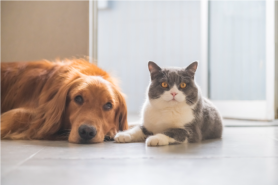
SEOUL -- South Korea's love for furry friends is showing no signs of slowing down. According to data released by global market analyst firm Euromonitor, the country's pet care market reached a staggering $2.45 billion in 2023, marking a 5.6 percent increase from the previous year. This impressive growth comes amidst a larger trend: the market has tripled in size since 2013, outpacing the global average of a 1.9-fold increase during the same period.
Several factors are contributing to this remarkable expansion. The COVID-19 pandemic, particularly during its initial wave in 2020, saw many single and remote-working households welcoming pets into their homes. This trend is reflected in data from the Ministry of Agriculture, Food and Rural Affairs, which shows that roughly one in four South Koreans owned a pet as of 2022, with dogs holding the top spot as the most popular choice.
The rising pet ownership is fueling a surge in pet-related businesses. From one-stop shops offering pet grooming, training, and even boarding, to a thriving pet veterinary industry, the market is booming. Data from the Korea Animal Health Products Association reveals that the domestic animal drug market alone reached 1.3 trillion won ($973 million) in 2021, representing a 10 percent year-on-year increase.
Euromonitor's report, released earlier this month, further underscores South Korea's position as a major global pet care market player. Ranking 14th globally in 2023 and boasting an annual growth rate exceeding 10 percent, the country is witnessing a rapid expansion in pet-related businesses. Data from the country's interior ministry revealed that as of February 2024, the number of such businesses had surpassed 40,000, with 11,154 being animal pharmacies and 9,610 being pet grooming shops.
Recognizing the industry's potential, South Korea's Ministry of Agriculture unveiled a plan in August 2023 to propel the domestic pet industry to a value of 15 trillion won ($11.2 billion) by 2027, up from 8 trillion won in 2022. This ambitious plan includes support projects like developing public pet insurance programs, alongside a goal to increase pet food exports by 3.4 times, reaching $500 million in 2027 from $149 million in 2022.
Copyright ⓒ Aju Press All rights reserved.




